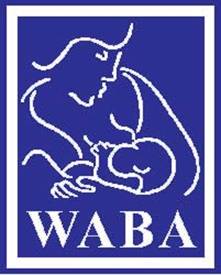Yes to breastfeeding rights, no to all violence!
“Breastfeeding is a key element in cultivating concern and respect for each other and the world we share”.
Did you know that obstetric violence can also negatively affect breastfeeding practices? Current socio-medical practices often deny women their rights to proper antenatal care, labour and delivery practices, and standard postpartum care, which results in low breastfeeding rates. Pregnancy, giving birth, and breastfeeding are all part of the sexual and reproductive cycle and thus integral to Sexual and Reproductive Health and Rights (SRHR).
In recognising the importance of SRHR on the International Day of Action for Women’s Health, the World Alliance for Breastfeeding Action (WABA) and La Leche League International (LLLI) hope to engage change-makers at all levels to call for a global action to improve the rights of women and children by acknowledging breastfeeding to be fundamental in attaining the highest standards of health for mothers and children.
Breastfeeding is a key intervention that has the potential to improve survival, health, and well-being of the population both in the short and long term. Therefore, women need to be given the information and support to breastfeed successfully to enable them to make informed choices and act upon them. Information on the benefits of breastfeeding, as well as the risks of artificial feeding, should be made available to women and their families so that they can make the best possible choices. Unnecessary separation of mother and baby, and medical procedures (such as drugs taken during delivery that impede breastfeeding) should be avoided. Clinical and community breastfeeding resources for support and problem-solving should be made available to all new mothers.
The White Ribbon Alliance states that Respectful Maternity Care also leads to successful breastfeeding. The respect and dignity afforded to a woman during pregnancy and childbirth is critical in ensuring that she feels supported during the first hours and days after giving birth when, the breastfeeding relationship is being established. When a woman gives birth in a respectful, supportive environment, where her rights are protected and her dignity is preserved, she is empowered to take care of her baby and breastfeed1. Consistent support and skilled assistance for the mother-baby dyad throughout the continuum of care empower women to have a more satisfying and effective breastfeeding experience2. The support should be present both within healthcare systems and in the communities.
Today’s global economic and labour conditions are changing rapidly, and have led to improvements in women’s participation in the economy. However, the benefits of paid labour do not reach all women and families equally. If women are to breastfeed as recommended, society bears the responsibility to support them. Specifically, this social responsibility means that protection, respect, facilitation, and fulfilment of these rights require universal recognition of the importance of breastfeeding as a social function. This will be achieved by extending access to paid maternity and parental leave, paid breastfeeding breaks, and family-friendly work environments.
Breastfeeding is enhanced by having consistent support from the baby’s father or the partner. Research shows that fathers not only have the capacity for care-giving, but that children also benefit directly from fathers’ involvement. Promundo’s MenCare campaign report states that involved and non-violent fatherhood allows girls and women to achieve their full potential and also makes men and families happier and healthier3. By creating opportunities for equitable sharing of parental and domestic responsibilities, new pathways emerge for building gender equality at home, workplace, and society at large.
On this International Day of Action for Women’s Health, we call upon all conscientious citizens to work together to achieve the Sustainable Development Goals (SDGs) by protecting, promoting and supporting breastfeeding. Collaboration toward this critically important goal will help ensure women’s sexual and reproductive health right to control their bodies, their sexualities, and their lives, free from coercion, discrimination and violence4.
For more information, contact:
Revathi Ramachandran (WABA) : revathi@waba.org.my
Lee Claassen (LLLI) : lee@llli.org
- http://whiteribbonalliance.org/opinions/respectful-maternity-care-can-lead-to-successful-breastfeeding/
- http://waba.org.my/archive/warm-chain/
- https://sowf.men-care.org/
- http://www.may28.org/
